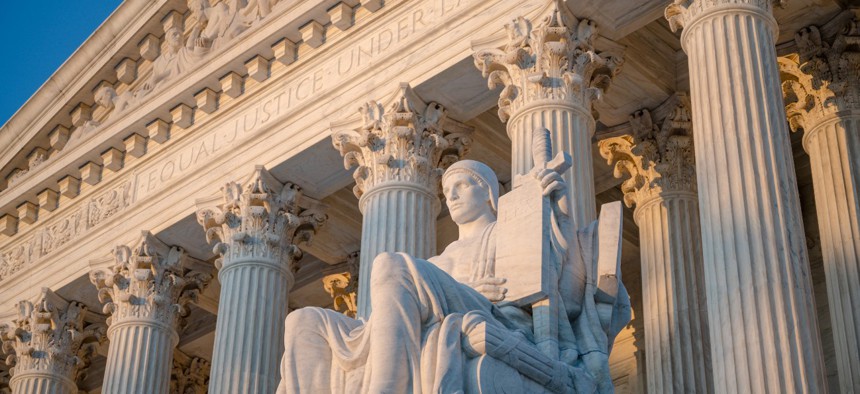
The Supreme Court on Monday announced it would hear the case about CFPB's funding structure. Richard Sharrocks / Getty Images
The Supreme Court Will Review the Consumer Protection Agency’s Funding Structure
An appeals court ruled in October that the Consumer Financial Protection Bureau’s funding structure was unconstitutional.
The Supreme Court announced on Monday that it will hear a case on whether the funding structure of the federal consumer protection agency created after the 2008 financial crisis is constitutional.
A three judge panel–all appointed by President Trump– for the U.S. Court of Appeals for the 5th Circuit ruled in October that the Consumer Financial Protection Bureau’s funding through the Federal Reserve instead of appropriations from Congress violates the U.S. Constitution’s separation of powers. The government then appealed to the Supreme Court.
A CFPB spokesperson said they are “pleased” with the Supreme Court’s decision to take up the case. "We are confident in the constitutionality of the CFPB’s funding mechanism, which is not novel or unusual,” the spokesperson continued. “As it did for the Federal Reserve Board and other federal banking regulators, Congress authorized the CFPB’s funding through legislation other than annual spending bills. This type of funding is a vital part of the nation’s financial regulatory system, providing stability and continuity for the agencies and the system as a whole.”
The spokesperson said they are grateful for the support of the attorney general and solicitor general, adding: “In the meantime, the CFPB will continue performing the vital work Congress charged us to perform on behalf of the American people.”
The case was initially brought in April 2018 by the Community Financial Services Association of America and the Consumer Service Alliance of Texas, both trade groups for the payday loan industry.
“The U.S. Supreme Court’s decision to grant the certiorari petition reflects the importance of the separation-of-powers issues at stake in this case,” both groups said in a statement. “As we have demonstrated, and the Fifth Circuit Court of Appeals has held, the CFPB’s self-funding mechanism lacks any contemporary or historical precedent, improperly shields the agency from congressional oversight and accountability, and unconstitutionally strips Congress of its power of the purse under the Appropriations Clause of the Constitution.” They added that they “look forward to presenting these arguments to the Supreme Court.”
Sen. Elizabeth Warren, D-Mass., a major player in creating and setting up the agency, said, “despite years of desperate attacks from Republicans and corporate lobbyists, the constitutionality of the CFPB and its funding structure have been upheld time and time again.” Additionally, “if the Supreme Court follows more than a century of law and historical precedent, it will strike down the Fifth Circuit’s decision before it throws our financial markets and economy into chaos.”
Jeff Hauser, executive director of the Revolving Door Project, which scrutinizes executive branch appointees and works to counter the influence of corporate America, said in a statement that if the court rules against the bureau, then “institutions like the Federal Reserve and [Federal Deposit Insurance Corporation], among others, will at some point soon lose their independence.”
Following the appeals court ruling in October, “a broad coalition of organizations has come together to defend the work of the 12-year-old agency,” said a press release from Americans for Financial Reform, a diverse coalition of more than 200 groups. “Since its creation, the CFPB has worked tirelessly to protect consumers from financial abuse, delivering relief of $13.5 billion to up to 175 million people.”
Meanwhile, Sen. Tim Scott, R-S.C., ranking member of the Senate Banking Committee, said, “the CFPB has long been an agency that lacks transparency and seeks to operate beyond its jurisdiction.” He added he looks “forward to reviewing the Supreme Court’s decision, when the time comes, and continuing my efforts to hold the CFPB accountable to the American people and Congress.”
Iain Murray, senior fellow at the Competitive Enterprise Institute, said the agency’s current funding structure is a “constitutional absurdity.” He hopes the high court will “restore the constitutional order and finally bring this rogue agency to heel.”
Rep. Andy Barr, R-Ky., chair of the House Financial Services Committee's Financial Institutions and Monetary Policy panel, said that Congress doesn’t need to wait for the court “to restore our Constitutional role” as he will be reintroducing legislation this week to subject the bureau to the appropriations process.
The bureau has been subject to various other legal challenges over the years. The Supreme Court ruled in June 2020 that the removal protections for the CFPB director were unconstitutional and said the president could remove the individual at will, but allowed the agency itself to stand.
Correction: An earlier version of this article said that Sen. Tim Scott, R- S.C., is the chair of the Senate Banking Committee. He is ranking member.







